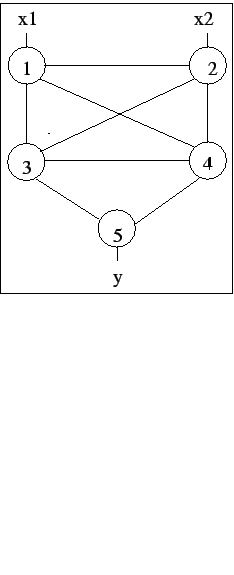




Next: Algorithms' Performance Comparison
Up: Performance Evaluation of the
Previous: Performance Evaluation of the
Contents
Index
In the GD and other learning algorithms, the value of the learning rate  has to be chosen. The convergence time and the accuracy depend on this choice. The optimal value of this parameter varies from one problem to another and from network architecture to another; however, most of the implementations set its value to 0.1.
The AM-LM has two parameters (
has to be chosen. The convergence time and the accuracy depend on this choice. The optimal value of this parameter varies from one problem to another and from network architecture to another; however, most of the implementations set its value to 0.1.
The AM-LM has two parameters ( and
and  ) to be determined, instead of one. In [87], the authors studied this problem and they determined through simulations ``ideal'' ranges for these parameters:
) to be determined, instead of one. In [87], the authors studied this problem and they determined through simulations ``ideal'' ranges for these parameters:
![$\zeta \in [0.85 \, ,0.95]$](img533.gif) and
and
![$dP \in [0.1 \, , 0.6]$](img534.gif) . We will show the performance of this algorithm when adapted to RNN for the first problem and for these ranges. To do that, for each pair of values, we counted the number of times the algorithm converges to a predefined mean square error MSE value (
. We will show the performance of this algorithm when adapted to RNN for the first problem and for these ranges. To do that, for each pair of values, we counted the number of times the algorithm converges to a predefined mean square error MSE value (
 ). For each case, the total number of tests is fixed to 100. We show in Figure 10.4 the results for the first problem. As we can see from these Figures, the values of these parameters effectively affect the performance of the algorithm. The best range for
). For each case, the total number of tests is fixed to 100. We show in Figure 10.4 the results for the first problem. As we can see from these Figures, the values of these parameters effectively affect the performance of the algorithm. The best range for  was [0.4, 0.6]. However, the impact of
was [0.4, 0.6]. However, the impact of  appears to be random and not easy to characterize. In addition, we can note that the impact of
appears to be random and not easy to characterize. In addition, we can note that the impact of  is more significant than that of
is more significant than that of  . Thus, we propose that this parameter must be fixed to 0.90 and that only
. Thus, we propose that this parameter must be fixed to 0.90 and that only  must be changed.
must be changed.





Next: Algorithms' Performance Comparison
Up: Performance Evaluation of the
Previous: Performance Evaluation of the
Contents
Index
Samir Mohamed
2003-01-08

![\fbox{\includegraphics[width=.95\textwidth]{RnnFigs/epsi-dp-ex1.eps}}](img536.gif)